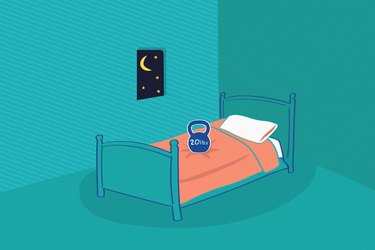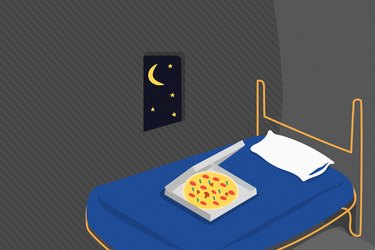
Raise your hand if this sounds familiar: You put "exercise" at the top of your to-do list for the day, but things keep popping up — work, phone calls, errands, you name it — and you suddenly find your only workout window is after dinner and before you hit the sheets. But then you wonder: Is it OK to work out at night?
After all, you've heard it can mess with your sleep. And while the benefits of exercise are seemingly boundless, good sleep is crucial, too.
Video of the Day
Video of the Day
To solve your dilemma, we tapped experts and dug into the research to find out just how detrimental it is to schedule a nighttime workout workout before you hit the hay.
Why Before-Bed Exercise Gets a Bad Rap
The idea that exercising before bed is bad has to do with the chemicals your body releases during a workout, says Matthew Mintz, MD, a board-certified internist based in Bethesda, Maryland. When you exercise, your brain tells your adrenal glands to make adrenaline, also known as epinephrine.
"Epinephrine kicks the heart into high gear by increasing the heart rate," he explains. This in turn improves blood flow, and therefore oxygen to the muscles, which helps overall performance.
However, epinephrine, like caffeine, is also a stimulant, which increases alertness. "This is good for exercise, but not necessarily good for sleep," Dr. Mintz says.
What Science Says About Working Out Before Bed
For many years it was just assumed that exercising before bed negatively affected sleep. However, there were little to no studies to back up the concept until recently. Newer studies have found that exercising before bed is not only harmless, but may even improve sleep.
For example, a February 2019 review of over 23 different studies published in Sports Medicine discovered that while people who exercised within four hours of going to sleep found no difference in the time it took them to fall asleep, their sleep quality improved. Study participants who exercised also enjoyed more hours of deep sleep than their sedentary counterparts.
However, there are a few factors that play a role in exercise's effect on your sleep and can help answer the age-old question: Is working out before bed bad?
Factors That Influence How Exercise Affects Sleep
1. Individual Biochemistry
Dr. Mintz maintains that there are lots of gray areas when it comes to whether exercising before bed is beneficial, and in many cases, it varies by the person. "Everyone reacts differently," he explains. "For some, the increased epinephrine may be stimulating and make it difficult to fall asleep. For others, being exhausted after a good workout may actually promote sleep. The bottom line is that you really need to listen to your body to determine what's right for you."
Lev Kalika, DC, owner of New York Dynamic Neuromuscular Rehabilitation & Physical Therapy in New York City, adds that a person's emotional involvement in the workout can also come into play. "The more excited you are, the harder it is going to be to fall asleep," he explains.
2. Workout Intensity
As far as whether specific workouts — such as walking versus HIIT — differ in terms of before-bed benefits or side effects, Dr. Mintz claims there isn't enough research to make that call. However, there is scientific evidence that the intensity of your workout influences sleep.
One small study, published September 2014 in the journal Sleep Medicine, surveyed 52 healthy adults who exercised before bedtime and then had electroencephalographic recordings (EEG's) performed to measure sleep. It found that the more effort these individuals thought they put in during their pre-bedtime workout, the better they actually slept.
However, a separate review published in the February 2019 journal Sports Medicine found that vigorous-intensity exercise less than an hour before bed negatively affected how long it took people to fall asleep, their total sleep time and how well they slept.
3. Timing
Athletic performance may vary according to the time of day that exercise is performed. That's mostly due to your body's circadian rhythms. Controlled by hormones in your body, circadian rhythms dictate physical and behavioral patterns like sleep, metabolism and body temperature (more on that below), per the Centers for Disease Control and Prevention (CDC).
Because everyone's circadian rhythms differ, late-night exercise may actually be better for some people because they're more alert at that time. So, how many hours before bed should you exercise and how late is too late to work out? It's best to complete your workout at least an hour before bedtime, according to the study published in Sleep Medicine. The researchers found that exercising within the hour can definitely have a negative effect on your sleep.
However, some experts, like Kalika, believe it is best to give yourself about two hours to let your body wind down for bed after a workout.
4. Body Temperature
Workouts may be more productive when body temperatures are highest. For the average person, body temperatures rise between 2 p.m. and 6 p.m. During this period, muscles are more flexible, perceived exertion is low, reaction time is quicker, strength is at its peak and resting heart rate and blood pressure are low, according to the American Council of Sports Medicine (ACSM).
For this reason, late afternoon and early evening may be a prime time for working out, physiologically speaking, as opposed to right before bed.
Tip
To see how working out before bed affects your sleep and exercise performance, consider maintaining an exercise, food and sleep journal. Note the time you worked out, the type of exercise you did, the intensity and the duration.
Next, make a note of if it was easy to fall asleep after working out before bed, if you slept through the night and if you woke up energized or sluggish. By collecting data, you'll be able to adjust your habits to improve your training or the quality of your sleep.
So, How Bad Is It Really to Exercise Before Bed?
Is exercising before bed something to lose sleep over? Well, yes and no.
If you want to make sure your workouts aren't going to have a negative effect on getting your zzzs, you need to take factors such as timing, intensity of your workout and your body's biochemistry into account. "If you feel that exercising before bedtime makes it more difficult to relax, then don't do it," Dr. Mintz suggests.
If you decide that exercising before bed is right for you, Kalika suggests choosing less-intense and more slow-paced workouts that do not involve emotional energy.
As for timing, just to be safe, Dr. Mintz suggests leaving at least an hour before the end of your workout and shutting down for the night. But listen to your body! If you find that you are having trouble falling or staying asleep, put some more time between your workout and lights out.
The bottom line: If you're a night owl who reachers your peak of activity and energy in the evening and are more sluggish at other times of the day, you may find greater benefits from working out at night.
But what's more important than the time of day that you work out is that you do exercise. After all, you're more likely to stick with the habit of exercise doing activities you enjoy when you enjoy them and not forcing it to happen.
The Key Takeaway
There's evidence to suggest nighttime workouts aren't as bad as you may think. If you find it works best with your body and your schedule to exercise at night, follow these tips:
1. Keep track of your workouts and sleep with a journal.
2. Stick to low-intensity and low emotional stress types of exercise like walking or yoga.
3. Leave about an hour in between the end of your workout and your bedtime to cool down.
- Journal of Circadian Rhythms: "Circadian Rhythms, Exercise, and Cardiovascular Health"
- Sports Medicine: "Effects of Evening Exercise on Sleep in Healthy Participants: A Systematic Review and Meta-Analysis"
- National Sleep Foundation: "How Does Exercise Help Those With Chronic Insomnia?"
- CCDC: "Physical Activity and Health: A Report of the Surgeon General"
- CDC: "Circadian Rhythms and Circadian Clock"
- ACSM: "Chronobiological Effects on Exercise"
Is this an emergency? If you are experiencing serious medical symptoms, please see the National Library of Medicine’s list of signs you need emergency medical attention or call 911.



